
The mountains you didn’t know you needed
Go to New Hampshire, leave the world behind, return happy :)
It was 10 pm on an inconsequential day in February when a friend texted me, “What if we went hiking tonight?” Deep in a notorious junior-year thermodynamics assignment, I picked up my phone to turn him down, as I had so many times before, with so many people. There was no question that I needed to finish my homework; as a student, any other decision was illogical, maybe even irresponsible. But then I stopped. What if I went hiking tonight?
Two hours later, we were driving to an IHOP outside of Boston (where for some reason everyone was speaking Spanish) to fuel up on midnight chocolate chip pancakes. An hour later we were belting “Life is a Highway” as we cruised down 93 into New Hampshire. We finally pulled into the parking lot of the Falling Waters trail at 2:45 am and began our ascent of Mt. Lafayette. The moon reflected so strongly off the snow-covered ground that we didn’t need headlamps, and the sky was heavy with constellations you could only dream of seeing in the city. We approached the summit at sunrise, eyelashes frozen and faces glowing pinkish-orange in the light. My friend, equally awed by the experience, said – “imagine all the other MIT students right now, asleep back in their dorms, and here we are in the middle of New Hampshire, climbing a mountain.”

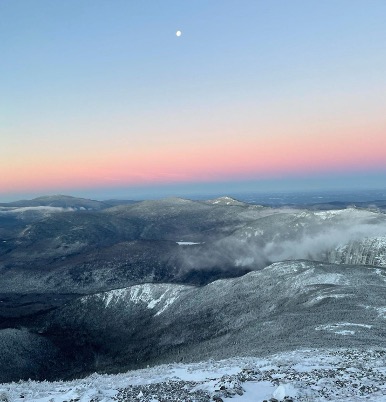
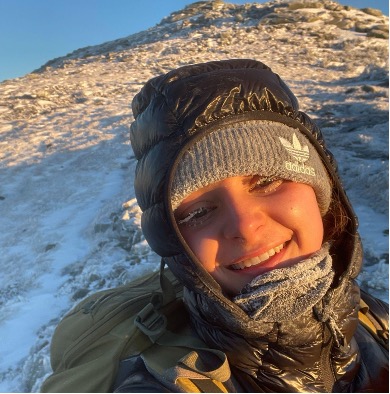
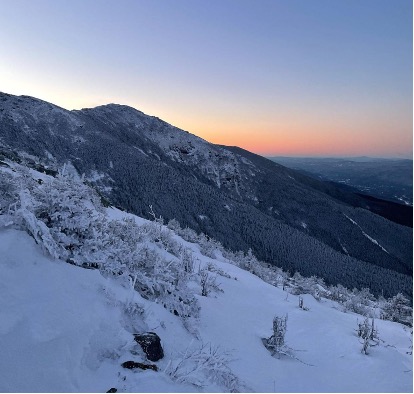
Pancakes, sunrises, and snowy eyelashes from the February hike on Franconia Ridge
Until this moment in my MIT career, I considered myself a pretty non-spontaneous student: I planned meticulously, I got all my work done before doing anything fun, and I liked schedules. Then, seemingly out of nowhere, the system started to break down – as much as I loved MIT, I felt like I was suffocating under the artificial light of dorm rooms and lecture halls. It can be hard to remember you’re a person when you spend hours underground in the Stata basement, adding zeros to your code to try and make your robots run. This loss of personhood leads every student, whether undergraduate, master’s, or PhD, to experience a sudden, primal urge to escape. I’m not just referring to the desire to take a walk across Harvard Bridge or try a new overpriced coffee shop – I mean a deep longing to leave lab work, research, and your degree behind and live out of a van in Colorado (that’s my alternative plan, anyway). Whether the feelings derive from a sense of inadequacy or intense burnout regarding your subject matter, the “escape plan” is a universal student experience, and the longer these feelings go unaddressed, the more problems they can cause. Very few of us actually want to leave MIT forever – my friends and I used to joke about creating a shuttle, like the ones to Trader Joe’s and Costco, that would drop you in a random field a few hours away, just so you could microdose the feeling of disappearing. It wasn’t until that first spontaneous hiking excursion, however, that I learned I could actually become the shuttle. It’s natural to stick to your rhythms, but for your sanity, it’s essential to break them.
Why do I recommend breaking rhythms with a trip to the White Mountains? Because unless you’re a course 16 building the next Mars rover, these mountains are the closest you’ll ever get to visiting another planet. The first time I crossed the treeline on Franconia Ridge, I thought I was on the moon. I went from waking up in sleepy, rainy Boston at ungodly hours of the morning to being on top of a peak, staring at the immensity of the world around 8 am. It feels surreal. It feels like being unstuck in time (to borrow Vonnegut’s famous phrase). It feels bigger than that now seemingly tiny school you have waiting for you in Cambridge. On top of a mountain, you lose your academic identity. You remember that you are not just a student or a researcher, that you are capable of more than rewiring circuits or solving quals problems, and that your life will not revolve around these things forever. Heck, you’ve gained 3,000 feet of elevation running on max three hours of sleep, the coke-flavored coffee you bought at 7/11 at 3 am, and a sleeve of Oreos – that’s clearly an accomplishment. Face to face with the beauty of an alien world and the absurdity of the experience, you find yourself thinking, “wow, this is what it feels like to be alive.”
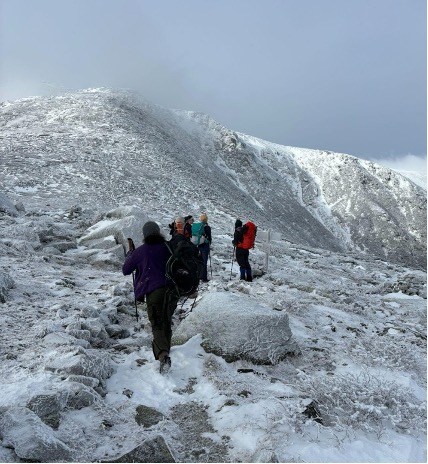
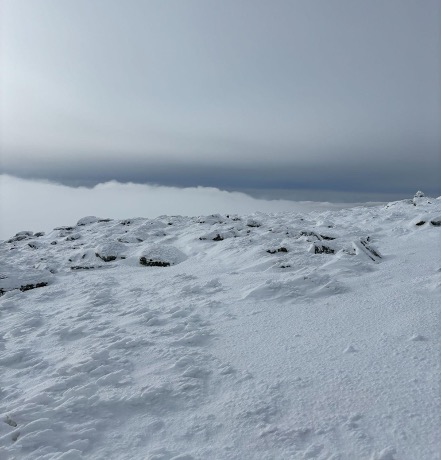
Mt. Washington via Boot Spurr, January 2024 with MIT Outing Club
In January of this year, I again found myself on a mountain, Mt. Washington, on a calm, undercast day where the clouds are below you, the sky is empty above you, and the world feels upside-down. Before the trip, I was in my lab agonizing over the design of a tricky transmission for a transtibial prosthetic. Suddenly I was climbing an ice-covered slope with several like-minded grad students in the MIT Outing Club (MITOC – you should join). The quiet of the entirely white landscape and the fact I was eating frozen brownies at 6,288 feet were a perfect mental reset. It’s common for graduate students to question what they are doing with their life, and whether they should follow their “escape plan” and run far far away. In my experience, however, sometimes all you need is a snowy cold dose of the perspective that comes from standing on an enormous frozen rock. Every time I drive back from the Whites, I find myself feeling human again, eager to return to my lab work and do what I really love, and realizing that I don’t need to actually leave everything behind for good, just occasionally.
Share this post:
